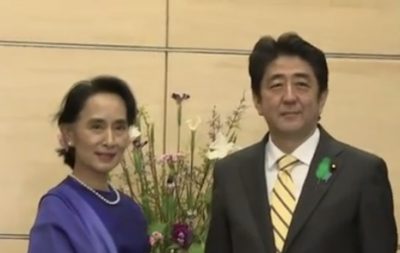Japan puts faith in Myanmar under Aung San Suu Kyi and her democratic path
Sawako Utsumi and Lee Jay Walker
Modern Tokyo Times

The nation of Myanmar is extremely multi-ethnic and multi-religious and under the State Counsellor, Aung San Suu Kyi, this nation is firmly focused on the democratization of this nation. Of course, certain limitations remain because of military power mechanisms within the body politic. However, unlike several regional nations, Myanmar is intent on modernization and democratization.
Japan fully understands the complexities that already existed prior to Aung San Suu Kyi taking office. This notably applies to ethnic tensions, various military groups, military dictatorship, poverty, economic backwardness, uneven development, a limited infrastructure, and a plethora of other serious issues.
Hence, Japan fully understands that Myanmar is intent on furthering democracy, unlike several regional nations that are ruled by a one-party-state. Thus, Japan seeks to assist Myanmar in various areas related to economic development, regional mechanisms related to the Mekong Delta, and providing a more neutral voice to the many complexities facing this nation. Therefore, Aung San Suu Kyi is highly respected within government and business circles in Japan.
Recently, the nations of Japan, India, Nepal, and others, abstained when an anti-Myanmar resolution was brought to the United Nations. The European Union (EU) and the Organization of Islamic Cooperation (OIC) made this resolution. China and the Philippines voted outright against the anti-Myanmar resolution.
Aung San Suu Kyi recently stated, “We sincerely hope that we can continue to receive the support and understanding of our friends from around the world, including Japan.”
Unfortunately, despite the enormous complexities facing Myanmar in transforming itself, the perennial “Bengali Muslim issue” in Rakhine is raised all the time. This is despite ARSA Islamists starting the crisis that unfolded. Also, the military angle in Myanmar is more serious in relation to other ethnic groups. However, it seems unjust to blame the armed forces of Myanmar for responding to ethnic and religious murders in Rakhine that were perpetrated by ARSA Islamists. What other option did the armed forces have?
Equally important, all the positive steps in Myanmar are being overlooked by a one-tract-agenda that doesn’t relate to the bigger picture. For example, the government of Myanmar is focused on attracting international investment, strengthening business law, developing the infrastructure, enhancing the democratic path, and other important issues. Therefore, Japan fully understands the mass complexities facing Myanmar – along with other regional nations and further afield.
What do Western democracies prefer? Do they prefer the destabilization of Myanmar, the return of military dictatorship, or for the people of Myanmar to be blighted by poverty and a lack of opportunities?
Japan doesn’t support this bleak logic. Instead, Japan seeks to support Myanmar in its democratic path and assisting in developing the infrastructure. In turn, by listening to Myanmar and taking a more neutral approach then Japan can earnestly raise difficult questions based on genuine friendship.

PLEASE DONATE TO HELP MODERN TOKYO TIMES
Modern Tokyo News is part of the Modern Tokyo Times group
DONATIONS to SUPPORT MODERN TOKYO TIMES – please pay PayPal and DONATE to sawakoart@gmail.com
http://moderntokyotimes.com Modern Tokyo Times – International News and Japan News
https://www.pinterest.co.uk/moderntokyotimes/ Modern Tokyo Times is now on PINTEREST
http://sawakoart.com – Sawako Utsumi personal website and Modern Tokyo Times artist
https://moderntokyonews.com Modern Tokyo News – Tokyo News and International News
PLEASE JOIN ON TWITTER
https://twitter.com/MTT_News Modern Tokyo Times
PLEASE JOIN ON FACEBOOK